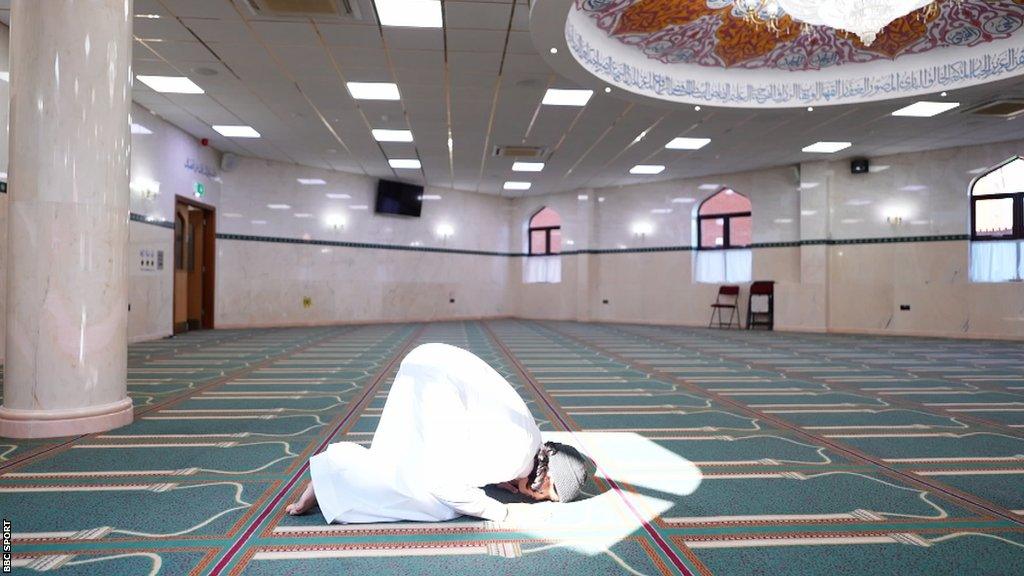Aston Youth Street Project cricketer on how the sport helped him deal with grief
- Published
When I play cricket I feel better
It's unsurprising that, as a British Pakistani boy growing up in Birmingham, Bilawal Latif's cricketing hero is Moeen Ali.
The England all-rounder started his career in Sparkhill, just five miles away from where 14-year-old Bilawal lives.
Inspired by his hero, Bilawal saw cricket as an enjoyable hobby until it soon also became a necessary escape that helped him navigate grief.
In May 2022, Bilawal's uncle was diagnosed with sinonasal carcinomas, a rare aggressive form of cancer, and died four months later.
"Playing cricket really saved my mental health, it would take my mind off losing my uncle and the coaches were really supportive," said Bilawal.
"My uncle loved cricket. He would pick me up from school and we would play together. He always inspired me but after he passed away I found it really hard to play again, it was tough on me mentally, I couldn't really understand that he was gone."
Bilawal is part of the Aston Youth Street Project, an initiative set up by national charity Chance to Shine, which aims to give children the opportunity to play, learn and develop through cricket.
"I've been coming to the sessions since 2015 with my friends from around the area," he said.
"The coaches make us sit down and talk about mental health at the start of our sessions and encourage us to talk about our feelings. Some kids don't talk about their mental health at home."
"In the Asian community we don't talk about mental health at home but when we come here it's different and we can express ourselves more.
"When we're playing cricket everyone is together and we all connect. We work as a team and that's what I love most about it."

Bilawal regularly visits his local mosque to help out with the food bank and connect with other people from his community
Bilawal's faith is a source of pride for him and he has found role models in Muslim cricketers.
"I really look up to Moeen Ali because he puts his faith before anything," he said.
"Moeen said his faith makes him stronger mentally and I remember reading an article where he said after retiring he'd be content cleaning a mosque., external I think about that a lot because I want to be like him.
"Faith for me comes first, I want to show people that Muslims can do anything, I don't want them to be shy. I want us to succeed."
Alongside his cricketing passion, Bilawal also hopes to open a 24-hour cancer support pharmacy in memory of his uncle.
"I remember how difficult it was for my uncle to find medication one night and my family drove around for ages," he said.
"I'd want to open a pharmacy that can help people in all hours of the day, that's my dream."
The Aston Youth Street Project's coach, Waqas Khan, is a qualified mental health practitioner and previously worked for Child and Adolescent Mental Health Services (CAMHS).
He hopes to break down the stigma around mental health and increase awareness among parents.
"At CAMHS I noticed we were getting a lot of referrals from the South Asian community, especially 16-year-olds and above because they wouldn't have to get permission from their parents," he said.
"A lot of them were worried about what their families would think.
"I realised my biggest passion was to help people and talk to youngsters in the role and share my knowledge around mental health.
"I used to watch Pakistan games early in the morning or play cricket in the garden, I want these sessions to resemble that.
"Some kids don't have access to an outdoor space where they can play but this is somewhere they can play and feel safe. They don't need to come with a kit bag or pay a membership fee. That's really important because a lot of kids wouldn't be able to come otherwise.
"Representation and exposure for young people, especially within the South Asian communities, is really important. I always tell the kids that we're not defined by our postcodes, we can make it wherever we want to."
In January 2003 two teenage girls Charlene Ellis, 17, and Letisha Shakespeare, 18, were shot dead in Birmingham. Their deaths were part of a feud between two notorious gangs called the Johnson Crew and Burger Bar Boys.
For Waqas, this story hit home as his uncle was also tragically shot dead by a member of one of those gangs in a case of mistaken identity.
"This is why I am so committed to helping people and working closely with young people to ensure they don't experience the hardship that me and my family had gone through," he explained.
Last year, the Aston Youth Street Project won the Chance to Shine 'Project of the Year' award recognising its commitment to using cricket to support the mental health of their participants.
For Bilawal, winning this award was a testament to transformational power that sports holds and he hopes to use it as a catalyst for achieving his dreams.
"After the award, it felt like I could do anything," he said.
"Without my uncle it was hard, for a long time I thought I wouldn't be able to do anything without him. But now, nothing seems impossible."